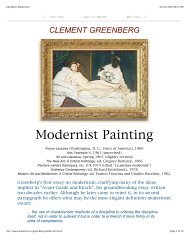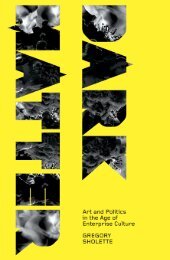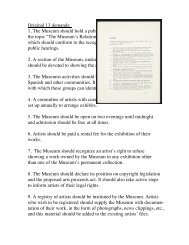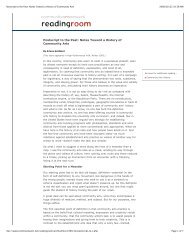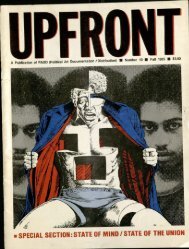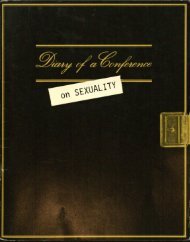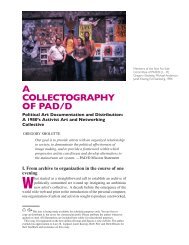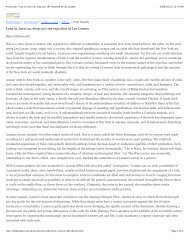The New Spirit of Capitalism - Dark Matter Archives
The New Spirit of Capitalism - Dark Matter Archives
The New Spirit of Capitalism - Dark Matter Archives
Create successful ePaper yourself
Turn your PDF publications into a flip-book with our unique Google optimized e-Paper software.
9e) a format <strong>of</strong> investment, this being a major pre-condition for each Cité‘s stability since, bylinking greatness to sacrifice (which takes a specific form in each Cité), it ensures that allrights are <strong>of</strong>fset by responsibilities;f) a paradigmatic test which, for each justificatory regime, best reveals a person’s greatness;g) a harmonious figure <strong>of</strong> natural order, conveying the ideal-types that correspond to theuniverses within which there has been a fair distribution <strong>of</strong> the quality <strong>of</strong> greatness.We analysed the two bodies <strong>of</strong> work through the filter <strong>of</strong> this analytical grid. It seemsthat the six justificatory regimes identified by Boltanski and Thévenot (1991) cannot fullydescribe all <strong>of</strong> the types <strong>of</strong> justification that can be found in the 1990s texts that we havestudied. We think that a new and increasingly influential justificatory logic has cropped up,one that emphasises mobility, availability and the variety <strong>of</strong> one’s personal contacts. To stressits novelty and specificity, we have encoded this logic as a 7 th justificatory regime, a ProjectsorientedCité. This refers to a form <strong>of</strong> fairness that is appropriate in a world which isorganised by networks (still described as being connexionist and reticular in nature). Table 3<strong>of</strong>fers a brief look at the characteristics <strong>of</strong> this latest Cité.Table 3: <strong>The</strong> Grammar <strong>of</strong> the Project-Oriented Justificatory RegimeEquivalency Principle (General Standard): activity; project initiation; remote links between peopleA State <strong>of</strong> Smallness: inability to get involved, to trust in others, to communicate; close-mindedness,prejudice, authoritarianism, intolerance, stability, over-reliance on one’s roots, rigidity…A State <strong>of</strong> Greatness: adaptability, flexibility, polyvalence; sincerity in face to face encounters;ability to spread the benefits <strong>of</strong> social connections, to generate enthusiasm and to increaseteammates' employabilityDirectory <strong>of</strong> Subjects : managers, coaches, innovatorsDirectory <strong>of</strong> Objets : computer and information technologies. <strong>New</strong> organisational devices (subcontracting,flexibility, outsourcing, autonomous units, franchises…).Natural Relationship: trusting and being trustworthy; ability to communicate; adaptability to others’needsGreatness ratio: “great” persons enhance “small” persons’ employability in return for their trust andenthusiasm for project work (i.e., their ability to take part in another project).Format <strong>of</strong> Investment: ready to sacrifice all that could curtail one's availability, giving up lifelongplansStandard (Paradigmatic) Test: ability to move from one project to another.Harmonious Figure <strong>of</strong> Natural Order: where the world's natural form resembles that <strong>of</strong> a networkHypothesizing the emerging <strong>of</strong> a new Cité where the relevant tests deal with theestablishment <strong>of</strong> connection does not imply that forming networks is something drasticallynew, as some recent network studies seem to suggest. Our stand is different. Networks,however large, are not any newer than the market was when Adam Smith wrote Wealth <strong>of</strong>Nations. But, it seems that it was not until the last third <strong>of</strong> the 20 th century that mediating - theart <strong>of</strong> connecting and making use <strong>of</strong> the most diverse and furthest ties - became autonomous,set apart from other activities behind which it had until then been hidden, and was identifiedand valued in itself. This process, we believe, is what constitutes an important novelty.In the Project-oriented Cité the general standard, with respect to which all persons’and things’ greatness is evaluated, is activity. Contrary to what happens in the Industrial Cité- where activity means “work” and being active means “holding a steady and wage-earningposition” - in the Project-oriented Cité, activity overcomes the oppositions between work andno-work, steady and unsteady, paid and unpaid, pr<strong>of</strong>it-sharing and volunteer work, andbetween that which can be measured in terms <strong>of</strong> productivity and that which cannot beassessed in terms <strong>of</strong> accountable performances. Life is conceived as a series <strong>of</strong> projects, allthe more valuable when different from one another. What is relevant is to be always pursuing



